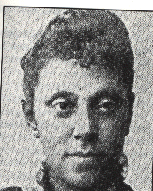



Gertrude Bustill Mossell was a writer and editor for newspapers and magazines that were distributed nationally. From the early 1870's to 1900's, she became a guiding voice to newly freed African-Americans. Through her column, "Our Women's Department", she gave women advice on running a household and raising children. Mostly her words were soft, but occasionally she crossed the line in speaking to African-American men. She often encouraged all African-Americans to read her column, but was often accused of crossing the "gender line."
Gertrude E.H. Bustill was born on July 3, 1855 in Philadelphia. Gertrude was the daughter of Charles and Emily Robinson Bustill. Her mother died when her two daughters were infants. Their father encouraged them to devote all of their time to the Bible and literary classics. At the age of sixteen Gertrude was directed toward journalism. At the graduation of her grammar school, Gertrude wrote a composition that was published in the Christian Reporter, a nationally distributed church newspaper.
During the 1870's Gertrude wrote for newspapers and taught public school. In 1883, she married Dr. Nathan F. Mossell. Gertrude gave birth to four children, two of which died during infancy. In 1885, she became woman's editor of the New York Freeman, which meant writing a weekly column for one of the leading African-American newspapers in the country. In 1889, she became women's editor of the Indianapolis World until 1892. During this period, she was also a Philadelphia correspondent for Woman's Era, a national newspaper for upper class black women.
In 1894, Gertrude's first book, The Works of the Afro-American Woman, was published. Little Dansie's One Day at Sabbath School, her second book, was published in 1902. In 1899, she helped organize the Philadelphia branch of the National Afro-American Council, precursor of the National Association for the Advancement of Colored People. In 1914, Governor John K. Tanner appointed Gertrude a delegate to the National Civic Movement Convention in Kansas City. On January 21, 1948 Gertrude died. The headline for her obituary read: "Widow of Dr. Mossell Succumbs at 92 years." It did not even mention her name.
![]()

Delilah Leontium Beasly was born in Cincinnati, Ohio on September 9, 1871. Delilah was the eldest of five children born to Daniel and Margaret Beasly. Delilah was schooled in Cincinnati's black public schools. Since her father was an engineer she was in a higher economic position than most black American's was. Not much else is known about her childhood.
Delilah began her newspaper career in 1883 writing for the Cleveland Gazette. It was an African American newspaper. She wrote briefly about church and social activities. In 1886 at age 15 she began sending items to the Sunday edition of the Cincinnati Enquirer. She never signed them so she was never identified. After the death of her parents Delilah worked briefly as a domestic for a white judge. Later she became a masseuse. She resumed her newspaper career in 1915 by protesting D.W. Griffith's "Birth of a Nation." The film had shown slaves as happy and carefree and freed men as drunken savages.
In 1918 she published two articles for the Journal of Negro History. After two decades of research she failed to secure a publisher for her manuscript. In 1919 she borrowed money to have the book published. "The Negro Trail Blazers of California" was the first history of the African American population in the state.
By 1923 Delilah was writing regularly for the Tribune. Her column was "Activities among Negroes" and her name was also published with the articles. She was paid ten dollars a week. She often spent far over forty hours a week collecting material. Beasley died in 1934 of heart disease. Before her death she was active in NAACP, International Council of Women, and a group was named after her. Her obituary read, "It was through her writings that the radical relations were eased greatly in the cosmopolitan city of Oakland. Her articles on activities among Negroes served as an educational contract and were unsurpassed."
![]()